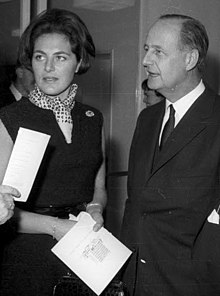Rudolf August Oetker
hideThis article has multiple issues. Please help or discuss these issues on the talk page. (Learn how and when to remove these template messages)
|
Rudolf August Oetker | |
|---|---|
 Rudolf-August and Maja Oetker in 1966 | |
| Born | 20 September 1916 |
| Died | 16 January 2007 (aged 90) |
| Nationality | German |
| Occupation | Owner and CEO, Oetker-Gruppe |
| Political party | National Socialist German Workers' Party (1930s–45) |
| Children | Richard Oetker |
| Relatives | August Oetker (grandfather) |
Rudolf August Oetker (20 September 1916 – 16 January 2007) was a German entrepreneur and former member of the Nazi Party,[2] who became a billionaire running his private food company Oetker-Gruppe, founded by his grandfather August Oetker.
Biography[]
Early life[]
Oetker served and volunteered in the Waffen-SS from 1941–1944. Rudolf Oetker became the president of his family-run business in 1944. The business was inherited from his grandfather, August Oetker, who invented a popular mixture of baking powder.[3][4][5][6]
Career[]
Rudolf August Oetker elevated the company to a household name in Germany today. The Oetker-Gruppe was one of the symbols of the post-World War II recovery effort in the country.
Oetker retired as executive director in 1981, turning the position over to his son August Oetker (jr.).
In 2006, his net worth was estimated by Forbes at US$8.0 billion.[1]
Personal life[]
Oetker married three times and had eight children.[1] His son Richard became CEO in 2010.
In 2014, the Oetker business empire was valued at $12 billion, and each of his eight children inherited an equal share of 12.5%, or about $1.5 billion:[3]
- August Oetker
- Richard Oetker
After discovering Oetker's Nazi past, his children hired a provenance researcher to investigate the origins of his art collection. They have begun returning artworks found to be stolen or looted to the heirs of their Jewish owners.[7] In 2019 a painting by Carl Spitzweg was restituted to the heirs of Leo Bendel who had been looted and murdered by Nazis.[8] The painting had been acquired through the Galerie Heinemann in München.[9]
See also[]
- Dr. Oetker
- Oetker Collection
- List of billionaires
- Colnaghi
- Richard Kaselowsky
References[]
- ^ Jump up to: a b c "Rudolf August Oetker & family". Forbes. Retrieved 1 April 2016.
- ^ Ignatzi, Christian (22 October 2013). "Another German company reveals its Nazi past". Deutsche Welle. Retrieved 9 September 2018.
- ^ Jump up to: a b de Jong, David (3 February 2014). "Nazi-Forged Fortune Creates Hidden German Billionaires". Bloomberg. Retrieved 1 April 2016.
- ^ "German pizza giant Dr Oetker reveals Nazi-era past". BBC News. 18 October 2013. Retrieved 13 May 2017.
- ^ "Dr. Oetker". Holocaust Online. Retrieved 13 May 2017.
- ^ "The Rudolf-August Oetker collection compensates the Emma Budge heirs for a silver cup in the Oetker collection since 2009". Lootedart.com. 19 May 2017. Retrieved 21 May 2017.
- ^ Hinckley, Catherine. "German Art Collectors Face a Painful Past: Do I Own Nazi Loot?". The New York Times. Retrieved 21 May 2017.
- ^ "Kunstsammlung Rudolf-August Oetker gibt Gemälde von Carl Spitzweg an die Nachkommen des jüdischen Sammlers Leo Bendel zurück" (PDF).
- ^ K.d.ö.R, Zentralrat der Juden in Deutschland (2019-11-20). "Dr. Oetker gibt Bild an jüdische Eigentümer zurück". Jüdische Allgemeine (in German). Retrieved 2021-04-03.
- Jungbluth, Rüdiger (2004). Die Oetkers (in German). Campus Verlag. ISBN 978-3-593-37396-6.
- Gotta, Frank (1981). Die deutsche Wirtschaftsprominenz 1981 von A-Z: Lexikon der 200 bedeutendsten zeitgenössischen Persönlichkeiten aus der Wirtschaft (in German). WEKA-Verlag. ISBN 978-3-8111-3046-3.
External links[]
- "Forbes World's Richest People". Forbes.
- "Is Dr Oetker really sincere about facing up to its Nazi past?". TVinemedia.
- Hinckley, Catherine. "Dr Oetker returns Van Dyck portrait looted by Göring". The Art Newspaper. Archived from the original on 2 February 2017. Retrieved 10 May 2017.
- 1916 births
- 2007 deaths
- German billionaires
- Businesspeople from Bielefeld
- P. & D. Colnaghi & Co. people
- People from the Province of Westphalia
- Dr. Oetker people
- Waffen-SS personnel
- 20th-century German businesspeople
- 21st-century German businesspeople
- 20th-century art collectors
- 21st-century art collectors
- German art collectors
- 20th-century English businesspeople